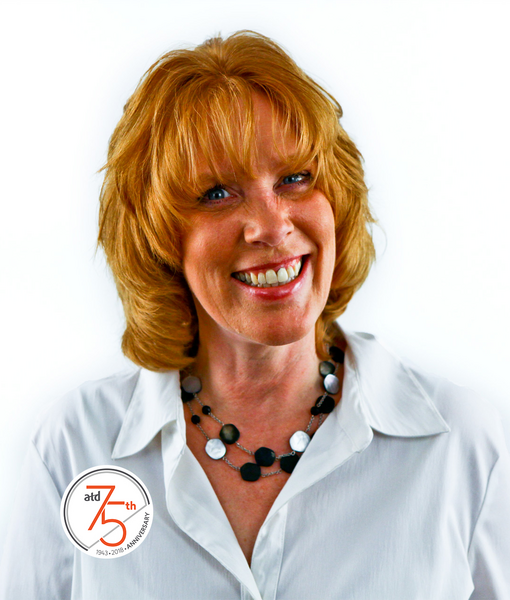ATD Blog
"Fundamentals Matter"
Published Thu Sep 13 2018


The worldwide talent development community is diverse. Our members bring a wealth of experience and insight to their work. We're spotlighting their stories.
Cora Lonning has been a member of ATD since 2001. Here's her story in her own words.
Tell us a little bit about yourself.
Currently I am an executive coach and organizational development consultant. I develop organizations through self-leadership skills; this is based on cornerstone competencies of self-management, self-awareness, relationship management, and organizational awareness. I have been in the talent management industry for over 15 years.
What are your personal and/or professional goals?
Professionally I will generate a digital class.
Professionally my book will be written.
Personally I continue to act in ways that promote health and wellness; and I express gratitude for all the ways I currently experience wellness.
Personally I continue to act in ways that promote strong and enduring personal relationships; and deeply appreciate my marriage that is the cornerstone of so much of what makes my life a magical place.
What challenges have you had to overcome in your career?
I think the biggest challenge, really, has been getting over myself. What has been great about being in the talent development field is you are exposed to development—daily! How cool is that? Therefore, I have taken assessment after assessment. Experienced 360 profile feedback, and continuously received feedback in sessions, from course designs, from presentations, and so on. When you are in a field that explores human behavior and in a role that is continuously out in front of people, one thing you get is feedback. At the very beginning when I would hear, "May I offer you some feedback," I would do the whole eye-roll thing, and internally be like, "Whatever."
Yes, I have had to get over myself!
Nowadays I look at feedback as the gift that it is—the perception of another that exists outside of my own lens. I also get to learn so much about another person through the feedback they give me about their experience of me, my presentation, the material, and so on. As Freud said, "No human can keep a secret when you listen long enough." It is in listening to each other—through feedback and disclosure—that we truly, truly learn about self and others. I have been my greatest challenge, and I have enjoyed every mile along the way, and thank all the players along the journey!
What’s the most valuable thing you’ve gained or experienced during your membership with ATD?
Learning from other learning professionals! The networking has been invaluable! This is in the meeting, the written knowledge (books, digital), and the webinars of professionals sharing knowledge.
Could you share any professional tips, specific to talent development, that you have picked up along the way?
Fundamentals matter. Stay on top of trends, technology, breakthrough research. However, through it all, do not forget the fundamentals. No matter how flashy the new technology, how enticing the new research, how sexy the latest trend, at the end of the day we still have a responsibility to provide a framework and pathway that enables and empowers the learner to learn. If the technology does not do that—or worse, gets in the way of that—it is not a good solution. If the latest trend facilitates that in ways we never imagined, jump on board! Fundamentally, what we do must pass the litmus test of, "Is this or is this not facilitating learning?"
What’s a common misconception you see when it comes to talent development?
So often the last person included in the talent development conversation—both in the business organization and in professional development organizations—is the learner. I wonder what it would look like to bring the learner into more conversations?
Not the experts, but the users! Less of what we think and more of what they experienced.
Less of our intentions and more of their application.
Yes, we do surveys; however, that is somewhat of a sterile—and managed by us—collection of data that has the potential for bias.
What would a national conference look like to bring in learners who talked about their learning experience in some of the best—and worst—environments? What would it look like to observe learners live in an LMS system? Trying to navigate learning framework?
Now that would be interesting!
The misconception, to me, is that we are the holders of knowledge. Which is a pedagogical perception. Our learners are adults. I believe it is time for an andragogical perception that places a high value on collaboration and mutual respect between learner and facilitator. This starts at the top.
Do you have any advice for people looking to further their careers?
Learn from others. Network—both inside and outside your industry. Build relationships with your leadership team and other leaders. What are business problems? What do solutions look like? Who is where you want to be? What are they doing and who are they doing it with? What do you have to offer that they might enter into a joint mentoring relationship?
What is your personal definition of talent development?
Providing the framework and clearing a pathway to skill development; and empowering individuals to become the best version of themselves while pursuing their personal and professional goals.
How do you stay motivated?
Making sure that I continue to do work that plays to my strengths at least 75 percent of the time! When I am doing what I love and what I am naturally good at, it does not even seem like work and I cannot wait to get to it! Pay me or not, I am still going to do it!
Then, when I do have to do things outside of my wheelhouse, I strategically spread that work out to ensure I do it in bits and pieces and try to do it after I have done work that is energy generating!
How do you find meaning in your work?
Doing what I love and loving what I do! Knowing what my core strengths are, what my values are, and connecting to my personal purpose ensures that I am able to ride the storm of day-to-day ups and downs.
When a downer day comes along I am able to say, "How does this align with my purpose of 'growing organizations through developing people'?" If it does, I know that there is meaning in what I am doing, regardless of how drab the task is. If it does not, I am able to let it go with intention!
You've Reached ATD Member-only Content
Become an ATD member to continue
Already a member?Sign In
